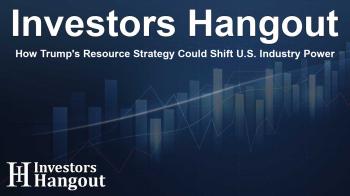How Trump's Resource Strategy Could Shift U.S. Industry Power

Understanding the U.S. Dependence on China
In a recent discussion, renowned economist Jim Rickards brings attention to America’s significant reliance on China for critical resources. This dependency has raised alarms as it poses a risk to the stability of various sectors, particularly in high-tech and manufacturing industries.
Rickards emphasizes that the U.S. government acknowledges its dependence by admitting that it relies on China for 100% of 20 essential minerals. These minerals are crucial for producing everything from advanced A.I. chips by NVIDIA to electric vehicles and satellites by industry pioneers like Elon Musk. Every device that requires power is affected by this reliance.
The Turning Point in U.S.-China Relations
A pivotal moment occurred when Beijing ceased exportation of these vital materials to the United States. This action has been compared to the economic shocks experienced during historical events, notably the Arab Oil Embargo of the 1970s. Rickards recalls advising the Nixon administration during that time, underlining the seriousness of such resource disruptions.
He explains that the halt in supply from China could lead the entire U.S. economy towards a potential crisis. Without proactive measures, various sectors reliant on these minerals may struggle to sustain production and innovation.
The Need for Policy Change
Rickards asserts that the crisis isn’t solely driven by foreign nations; domestic policies have also contributed significantly. He criticizes past administrations for prioritizing environmental protections over the exploitation of natural resources that could benefit the American populace. His observations bring to light the irony that essential materials needed for growth remain untapped beneath American soil.
Moreover, he urges the government to reconsider its approach, highlighting that the U.S. has extensive mineral resources that are not being utilized effectively. He argues that if the country intends to secure its technological and industrial future, decisive action is imperative.
Trump’s Bold Plans for Resource Utilization
One of the most compelling aspects of Rickards’ analysis is his view on Donald Trump’s new policies aimed at boosting America’s resource independence. He notes that Trump has taken significant steps by issuing an Executive Order that facilitates the mining of precious minerals hidden under U.S. waters.
Rickards describes the oceans as an untapped 'continent' of wealth, suggesting that there are expansive deposits ready for extraction. This initiative could mark a profound change in how America deals with its resource management and global competitiveness.
The Path to National Prosperity
With such policies, Rickards argues that Trump has the potential to transform his presidency into a historically significant era. He presents a hopeful vision where individuals willing to invest in these resources might reap immense rewards in the coming years as the nation reclaims its industrial prowess.
As Rickards frames it, this resource battle intertwines economic vitality and geopolitical maneuvering. The implications extend beyond mere survival; they represent an opportunity to reshape America's standing on the global stage.
The Future Implications for Investors
The pressing nature of resource extraction and management signifies an extraordinary opportunity for investors and ordinary citizens alike. Rickards underscores that those prepared to stake early claims in these resources could genuinely witness an explosion in their financial success. The prospect of securing indispensable materials could well redefine America’s economic landscape.
Conclusion: The Call for Action
In conclusion, Jim Rickards conveys a message of urgency. The time for change is now if the United States hopes to break free from reliance on foreign resources and secure its place as a leader in global innovation. With political will and strategic planning, America can harness its vast resources and drive toward a more independent and prosperous future.
Frequently Asked Questions
What is the primary concern discussed by Jim Rickards?
Jim Rickards expresses concern about America’s dependence on China for crucial resources, which could threaten the U.S. economy.
How does Rickards compare the current situation to historical events?
He likens the present crisis to the Arab Oil Embargo in the 1970s, emphasizing the need for strategic resource management.
What steps has Trump taken to address U.S. resource management?
Trump has issued an Executive Order to facilitate the mining of essential minerals found under the ocean floor, aiming to enhance U.S. resource independence.
What are the potential outcomes of Trump's resource initiatives?
If successful, these initiatives could lead to improved economic conditions and increased wealth for those who invest in these resources.
Why is the current conversation about resources so critical?
The dialogue about U.S. resource independence is essential for ensuring national security, economic stability, and reducing reliance on foreign nations.
About The Author
Contact Dylan Bailey privately here. Or send an email with ATTN: Dylan Bailey as the subject to contact@investorshangout.com.
About Investors Hangout
Investors Hangout is a leading online stock forum for financial discussion and learning, offering a wide range of free tools and resources. It draws in traders of all levels, who exchange market knowledge, investigate trading tactics, and keep an eye on industry developments in real time. Featuring financial articles, stock message boards, quotes, charts, company profiles, and live news updates. Through cooperative learning and a wealth of informational resources, it helps users from novices creating their first portfolios to experts honing their techniques. Join Investors Hangout today: https://investorshangout.com/
The content of this article is based on factual, publicly available information and does not represent legal, financial, or investment advice. Investors Hangout does not offer financial advice, and the author is not a licensed financial advisor. Consult a qualified advisor before making any financial or investment decisions based on this article. This article should not be considered advice to purchase, sell, or hold any securities or other investments. If any of the material provided here is inaccurate, please contact us for corrections.

